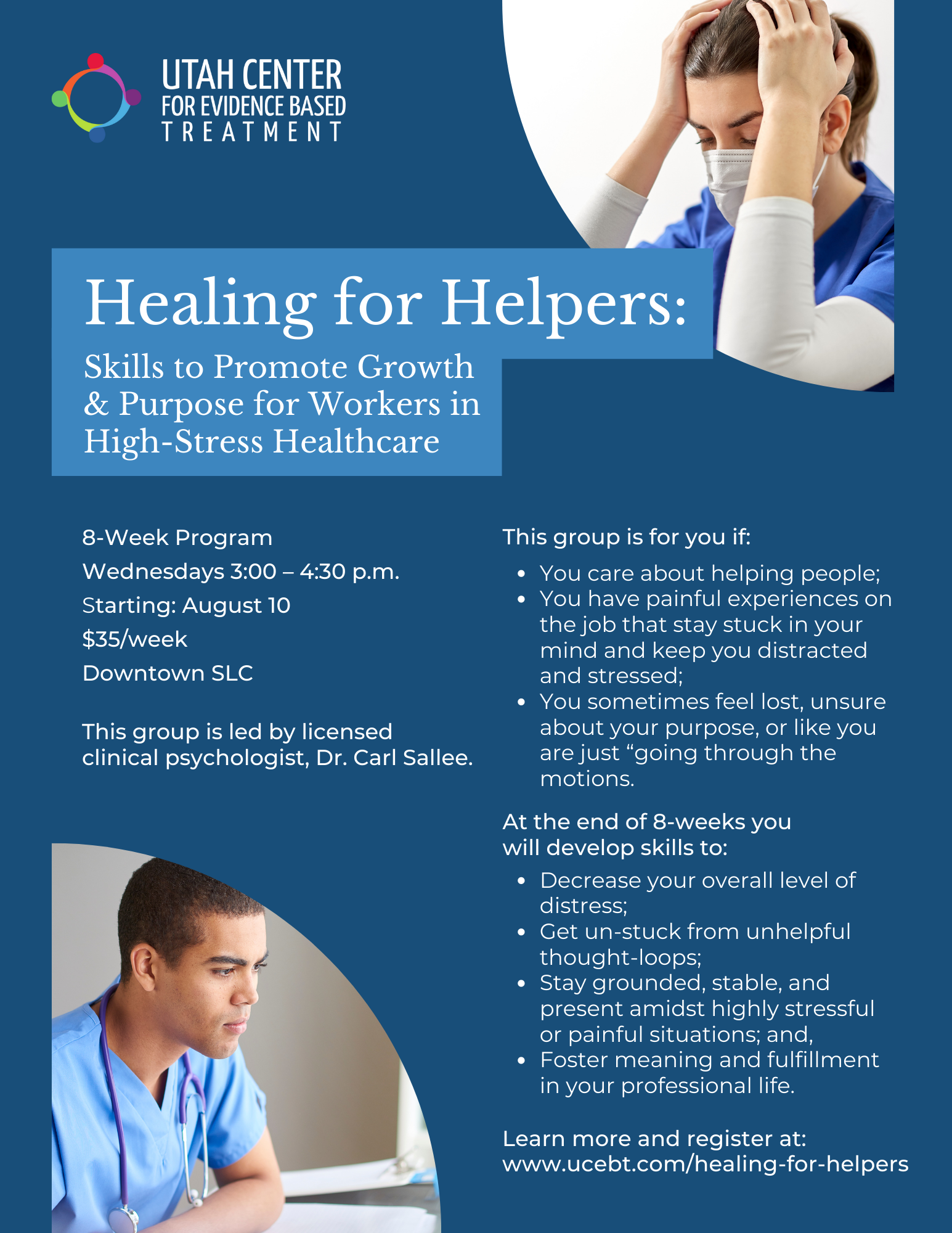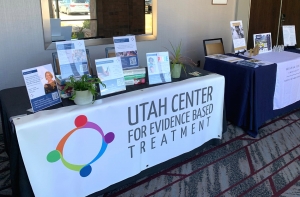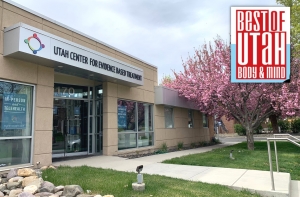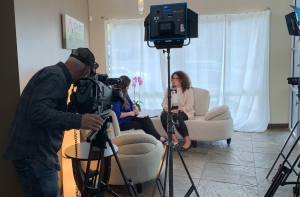Jennifer Van Gorp
Crisis Resources
- Warm Line – (801) 587-1055
- This phone number is for Salt Lake County residents who are not in crisis, but seeking support, engagement, or encouragement.
- Certified Peer Specialists offer support and empower callers to resolve problems by fostering a sense of hope, dignity, and self-respect.
- Callers may speak with peer specialists daily 9 am to 10 pm.
- HMHI (Huntsman Mental Health Institute) crisis phone line – (801) 587-3000
- Services are available 24/7 both locally and statewide as the Utah affiliate for the National Suicide Prevention Lifeline (dial "988" to immediately connect).
- Licensed clinicians provide prompt and compassionate crisis intervention, suicide prevention, information and referrals as well as follow-up services, emotional support, and assistance to individuals experiencing emotional distress or psychiatric crisis.
- HMHI (Huntsman Mental Health Institute) receiving center – 801-587-7988 (direct; or call crisis line)
- A short-term (up to 23 hours) secure center providing therapeutic crisis management, an assessment based on strengths and psychiatric needs, medication intervention, and wellness recovery/discharge planning
- Mobile crisis outreach team (MCOT) – call crisis line: (801) 587-3000
- HMHI (Huntsman Mental Health Institute) MCOT provides a free, prompt, face-to-face response to any resident of Salt Lake County who is experiencing a behavioral health crisis
- Youth and adult services teams are available 24/7 and offer consultation and support to individuals, families, schools, treatment providers and first responders
- Emergency department – (801) 581-2291 (University of Utah); (801) 350-4111 (SL Regional Medical Center); (801) 408-1181 (LDS Hospital)
- Refer a client to the ED if they have ingested alcohol, drugs, or medications, are unresponsive to skills, are unable to use the services above, or are in the midst of a crisis.
- Calling the police or 911 can facilitate ambulance transport of a crisis if needed
- Urgent crisis – call 911
- When in doubt, call 911.
Healing for Helpers
Healing for Helpers: Skills to Promote Growth and Purpose for Workers in High-Stress Healthcare
What: Group for learning psychological skills
Duration: 8-weeks
When: Tuesdays, 5:30 p.m. to 7:00 p.m., starting September 6, 2022
Where: Virtual or In-Person; Utah Center for Evidence Based Treatment, 170 South 1000 East Suite 201, Salt Lake City, Utah
Price: $35/week
Classes taught by: Dr. Carl Sallee, Licensed Clinical Psychologist
REGISTER HERE: https://forms.office.com/r/p6xsLNRNz4
This group is for you if any of the following resonate with your experience:
- You are in a healthcare profession because you care about any of the following things: helping people, being someone who facilitates healing, being a compassionate person, being an empathic person, advocating for vulnerable/sick/hurting people, learning about humanity through science/discovery, or any other significant guiding value/moral.
- You experience high stress situations/events on the job that are very difficult to manage because they cause strong painful emotions and they tend to stick in your mind even when you don’t want to be thinking about them so often. OR, if you haven’t experienced something like this, because of the nature of your job, you wouldn’t be surprised if you do experience something like this in the future.
- You care about being the best possible version of yourself both on and off the job, but you find it very difficult to do so because showing up to work or life involves feeling strong and painful emotions on a regular basis.
- You frequently find yourself stuck in your own head, which can be distracting and distressing at times.
- You are in a healthcare profession but you sometimes feel lost, unsure about your purpose, or like you are just “going through the motions.”
At the end of 8 weeks, you will:
- Develop skills to foster meaning and fulfillment in your professional life through clarifying the values that motivate you and identifying creative and flexible ways to whole-heartedly pursue these values even in the face of barriers, stress, or painful emotions.
- Learn evidence-based skills that help you stay mindfully grounded, stable, and present amidst highly stressful situations, such that the painful emotions involved do not overwhelm you or throw you off course.
- Learn evidence-based skills that help you get un-stuck from thought loops and ruminations that are unhelpful when it comes to your ability to stay engaged in what matters most to you in life.
- Develop a deeper level of self-compassion that will ultimately also help you be more effective at showing compassion and care for the people you serve in your job.
- Decrease your overall level of distress because you will learn skills to effectively move through the expected stressors of your job in a way that helps you grow, rather than exacerbates the initial stress.
REGISTER HERE: https://forms.office.com/r/p6xsLNRNz4
The research:
This group primarily uses an evidence-based therapy called Acceptance and Commitment Therapy (ACT).
Research findings showed ACT led to reduced workplace burnout through fostering self-compassion, mindfulness, and values as mediators. Skills in ACT that build self-compassion, mindfulness, and clarity about one’s values were connected to lower mental weariness, which is connected to less workplace burnout:
Prudenzi A, Graham CD, Flaxman PE, Wilding S, Day F, O’Connor DB (2022) A workplace Acceptance and Commitment Therapy (ACT) intervention for improving healthcare staff psychological distress: A randomised controlled trial. PLoS ONE 17(4): e0266357. https://doi.org/10.1371/journal.pone.0266357
ACT has also been shown to reduce psychological distress for folks working in direct client care healthcare positions, who have a high baseline level of distress about their work:
Reeve, A., Tickle, A. and Moghaddam, N. (2018), "Are acceptance and commitment therapy-based interventions effective for reducing burnout in direct-care staff? A systematic review and meta-analysis", Mental Health Review Journal, Vol. 23 No. 3, pp. 131-155. https://doi.org/10.1108/MHRJ-11-2017-0052
Increasing psychological flexibility through ACT intervention has evidence for decreasing overall work-related distress:
Flaxman, & Bond, F. W. (2010). A randomised worksite comparison of acceptance and commitment therapy and stress inoculation training. Behaviour Research and Therapy, 48(8), 816–820. https://doi.org/10.1016/j.brat.2010.05.004
Studies support that emotional acceptance skills (which are taught in this group) are connected to lowered physical and mental/emotional panic symptoms during acute states of stress;
Longitudinal research suggests that low emotional acceptance skill are connected to higher degrees of psychological distress in long-term follow-up after going through highly negative events. Conversely, high skill in emotional acceptance correlated to a significant decrease in PTSD symptoms for Veterans, regardless of combat exposure. Put in simple terms, evidence suggests that one of the core skills taught in this ACT group, acceptance of painful emotions, leads to less psychological impairment following stressful events;
Willingness to feel painful emotions during and after high stress situations has been identified as an adaptive coping process that helps people adjust after the situation, rather than staying stuck in high distress after the situation is over; and,
In populations with high risk for developing depression, studies show that a high level of emotional acceptance (as a learned skill or baseline trait) is a protective factor against developing depression:
Shallcross, A. J., Troy, A. S., Boland, M., & Mauss, I. B. (2010). Let it be: Accepting negative emotional experiences predicts decreased negative affect and depressive symptoms. Behaviour Research and Therapy, 48(9), 921–929. https://doi-org.georgefox.idm.oclc.org/10.1016/j.brat.2010.05.025
REGISTER HERE: https://forms.office.com/r/p6xsLNRNz4

Join us on Friday, July 22, 2022 from 12:00 p.m. - 2:00 p.m. for this CEU virtual event featuring presentations from three of our psychologists! Free to attend or $20.00 for 2.0 CEUs pending approval by UPA, NASW-UT, UAMFT, and UMHCA. Everyone who registers will be emailed the recording, presentation slides, and CE Quiz within one week following the event.
This lecture will review the criteria and traditional conceptualizations of post-trauma reactions from the DSM-5 and discuss emerging research of less traditional conceptualizations of trauma.
Specifically, the presenters will explore post-trauma reactions in the context of relationships (e.g. related to betrayals and affairs); presenters will highlight the proposed criteria for complex trauma and discuss trauma-informed interventions that address its unique sequalae of symptoms; and presenters will discuss considerations of trauma-informed care for children and adolescents.
Learning Statement:
At the conclusion of this presentation, attendees should have a better understanding nontraditional forms of trauma including affairs and relationship distress; a better understanding of PTSD and C-PTSD/complex trauma disorder; and a better understanding of trauma-informed care for children and adolescents.
Learning Objectives:
- Review literature of trauma, PTSD, and the overlap between related conceptualizations
- Gain a better understanding of complex trauma disorders
- Identify considerations of trauma-informed care for children and adolescents
References:
American Psychiatric Association. (2013). Diagnostic and statistical manual of mental disorders (5th ed.). https://doi-org.ezproxy.frederick.edu/10.1176/appi.books.9780890425596
Brown, E. J., & Campbell, C. L. (2009). Children’s refractory posttraumatic stress disorder: An ecological, evidence-based perspective. In D. McKay & E. Storch (Eds.), Cognitive behavior therapy for refractory cases in children and adolescents (pp. 201-229). New York, NY: Springer.
Cohen, J. A., Mannarino, A., P., & Deblinger, E. (2012). Trauma-Focused CBT for children and adolescents: Treatment applications. The Guilford Press: New York, NY.
Cook, A., Spinazzola, J., Ford, J., Lanktree, C., Blaustein, M., Cloitre, M., ... & Van Der Kolk, B. (2005). Complex trauma in children and adolescents. Psychiatric annals, 35(5), 390Kliethermes, M., Schacht, M., & Drewry, K. (2014). Complex trauma. Child and Adolescent Psychiatric Clinics, 23(2), 339-361
Luyten, P., Campbell, C., & Fonagy, P. (2020). Borderline personality disorder, complex trauma, and problems with self and identity: A social‐communicative approach. Journal of Personality, 88(1), 88-105.
Nikulina, V., Hergenrother, J. M, Brown, E. J., Doyle, M. E., Filton, B. J., & Carson, G. S. (2008). From efficacy to effectiveness: The trajectory of the treatment literature for children with PTSD. Expert Review of Neurotherapeutics, 8, 1233-1246.
About the presenters:
Stephanie Taylor, Ph.D. is a licensed clinical psychologist who specializes in the treatment of trauma and its collateral effects. In addition to providing Cognitive Processing Therapy (CPT) and Eye Movement Desensitization and Reprocessing Therapy (EMDR), Dr. Taylor recognizes the significant overlap between mind and body and often includes somatic therapies in session. A background in trauma has informed Dr. Taylor’s work with couples as well. She brings a trauma-informed perspective into session and offers couples therapy based in the Gottman Method. In addition, Dr. Taylor has a background in humanistic and existential therapy which has proven particularly helpful in the exploration of spirituality, meaning, identity, and sexual wellness.
Jordan Kugler, Ph.D, is a licensed clinical psychologist at UCEBT who specializes in Dialectical Behavior Therapy (DBT), Prolonged Exposure (PE), Acceptance and Commitment Therapy (ACT), Cognitive Processing Therapy for PTSD (PTSD) and Cognitive Behavioral Therapy (CBT). Jordan completed an APA accredited internship at the Salt Lake City VA healthcare system. Jordan has experience in several settings, including VA outpatient clinics, community mental health settings, student counseling centers and trauma-informed outpatient clinics. He has research and clinical interests in suicidal behavior and post-trauma reactions. Jordan’s therapeutic style is upbeat, collaborative and emphasizes identifying, developing and actualizing his client’s values.
Sloan Strike, Ph.D., is a licensed psychologist at UCEBT who specializes in evidenced-based therapies with adolescents, young adults, and their families. Over her 12 years in New York City, Sloan specialized in providing family therapy and parenting support. She values working with youth and their families to create opportunities for improved communication and healthier relationships. She is also certified in Trauma-Focused Cognitive Behavioral Therapy, and has extensive training working with adolescents and young adults who have experienced trauma and suffer from anxiety and depression. Additionally, Dr. Strike is certified in The Gottman Method for couples therapy.
Program Notices:
Conflicts of Interest: None noted.
Commercial Support: None.
Program Director for Trauma, Stress, Resilience
UCEBT Trauma, Stress, and Resilience (TSR) Program Director Open Position
Job Type: Full-time
Salary: $100,000-$120,000/year
Hours: 40 hours per week
Education: Doctorate (Required)
License: Psychologist, Eligible in Utah (Required), PSYPACT (Preferred)
Work authorization: United States (Required)
About Us:
Utah Center for Evidence Based Treatment (UCEBT), a growing outpatient practice, is seeking a licensed outpatient Program Director-Therapist for our TSR Clinical Program. Specifically, we are looking for professionals with supervisory experience and expert training in evidence-based therapies for trauma treatment. Our TSR team is a thriving program with community ties to support the care of a range of individuals including: survivors of DV, sexual trauma, and childhood abuse and neglect; survivors of single-incident events such as car accidents and natural disasters; medical professionals; and victims of trauma related to race, sexual orientation, and/or gender identity.
We are a multidisciplinary team of expertly trained professionals, including psychologists, nurse practitioners, doctoral trainees, and expert consultants. Our work is based on a core set of values including specialized care, scientific rigor, accountability, and data-based results. UCEBT staff have access to extensive training and experience in the treatment and management of a wide range of mental health difficulties across the lifespan. In addition to providing clinical services, many of our staff provide supervision to trainees, offer expert community consultation, and hold faculty appointments at the University of Utah.
UCEBT is dedicated to fostering a diverse, vibrant, and responsive work environment. Employees are able to designate preferences for in-person care, telehealth, or hybrid scheduling. We adapt to support the individual and family needs of our staff, including flexible work schedules and opportunities for advancement and innovation. Employee happiness and work-life balance are regularly discussed in meetings and supported through our center policies.
For Applicants:
Interested candidates should have a terminal degree (e.g., PhD/PsyD) in Clinical Psychology, Counseling Psychology, School Psychology, or a related mental health field. Candidates must be license eligible to practice in the State of Utah and PSYPACT is preferred. Interpersonal warmth, openness to feedback and interest in continual learning are essential. Candidates should be highly attentive, self-assured, and proactive, with solid decision-making skills and adept clinical judgement. Candidates from diverse backgrounds and/or with specific skillsets in treating diverse populations are encouraged to apply. The clinician will have the opportunity to see clients in the age range of their interest(s), including children, adolescents, and adults.
Benefits:
- 100% premium covered by UCEBT for personal health insurance, vision and dental
- Retirement savings with company contribution
- Paid annual training stipend
- Licensure renewal assistance and CEU tracking
- Monthly group wellness activity
- Flexible schedule
- Costco membership
- Monthly phone reimbursement of $50
- Unlimited paid time off
- Paid holidays
- Ongoing didactic training
- Short Term Disability insurance coverage
- One month of paid sabbatical leave
- Option to work in multiple locations, including remote telepsychology practice
- Company retreats
Applicant:
- 2 years post licensure (or close)
- Evidence of advanced training and expertise for modalities used in treating trauma
- Willingness to train others internally and externally
- Willingness to network within the community and nationally
Responsibilities include:
- Plans, develops, implements and maintains vision and day-to-day operations of clinical program.
- Ensures expertise of team members with ongoing oversight and coordination of trainings in Program area.
- In conjunction with outreach coordinator, develops and implements public relations and outreach plan for specific program
- Provides oversight and timely consultation for urgent clinical issues that arise with the clients and clinicians within their program.
- Implements agency-wide QA and Outcome Measurement initiatives within their program. Supports clinicians to make data-informed clinical decisions in client care.
- Provision of direct clinical care within your program.
- Provision of direct clinical care to a smaller caseload of clients from at least one other Program (DBT, Anxiety & Mood Disorders or Assessment & Testing).
- Manages program budget
- Representation of program at weekly meetings of Program Directors
- Liaison between administrative departments and Program Directors through representation at weekly meetings
- Occasional on-call evening or weekend coverage.
- Conducts psychological assessments for children and/or adults
- Manages a caseload within UCEBT expectations
- Completes documentation in a timely manner
- Exemplifies conduct consistent with UCEBT values of professionalism, collaboration, and compassionate care
Qualifications:
- Psychology licensure in Utah (required)
- Must have valid driver’s license in the state of Utah and means of transportation
- Formal training and expertise in evidence-based treatments
- Specialty training or certification in a clinical area of expertise (e.g. EMDR, PE, CPT, TF-CBT)
- Demonstrated program and supervisory experience
- Ability to read and communicate effectively in English
- Strong written and verbal skills
- Basic computer knowledge
- Exceptional interpersonal skills to work effectively on interdisciplinary projects
- Critical decision making/problem-solving skills
- Knowledge of DSM-5 diagnoses/disorders
Workplace Requirements:
- Sitting 70-75% and Standing 25-30%
- Occasionally lifting objects such as boxes or client charts
- Walking up and down stairs
- Need access to Telehealth compliant work area, laptop, private internet access
This position requires a thorough knowledge of law, regulations, and ethics related to the provision of mental health services. Candidate will be expected to acquire this knowledge immediately if hired:
- The operations manual of UCEBT, particularly issues of client relations and privacy.
- HIPAA- Health Insurance Portability and Accountability Act of 1996 (HIPAA)- Regulations & Standards Utah State Law regarding mental health, particularly related to consent to treatment and maintenance of health care information-Title 62A Utah Human Services Code: Chapter 15 Substance Abuse and Mental Health Act.
- The American Psychological Association Ethics of Psychologists and Code of Conduct (or field-appropriate equivalent).
Interested applicants are invited to submit a cover letter, CV, and the names/contact information of 2-3 professional references to . Applications will be reviewed on a rolling basis and will continue until the position is filled.
Utah Center for Evidence Based Treatment is an equal opportunity employer that is committed to diversity and inclusion in the workplace. We prohibit discrimination and harassment of any kind based on race, color, sex, religion, sexual orientation, national origin, disability, genetic information, pregnancy, or any other protected characteristic as outlined by federal, state, or local laws.
This policy applies to all employment practices within our organization, including hiring, recruiting, promotion, termination, layoff, leave of absence, compensation, benefits, and training. Utah Center for Evidence Based Treatment makes hiring decisions based solely on qualifications, merit, and business needs at the time.
Holding Space for Pride
Join us on Friday, June 17 from 10:00 a.m. - 11:30 a.m. MST for our webinar, "Holding Space for Pride: Best Practices in Intersectional LGBTQ+ Affirmative Care".
To commemorate LGBTQIA+ Pride Month, this presentation will discuss best practices in queer affirmative care. We will discuss the latest updates in identity development and protective factors of the community, as well as discuss intersectionality of religious and ethnic culture as it relates to members of our community.
This presentation will present up-to-date research on topics affecting LGBTQ+ individuals in the context of treatment, as well as provide best practices and model therapeutic approaches for intersectional topics (e.g. race, gender, relationship configuration, religious belief).
By the end of this presentation, attendees should be able to:
1) Identify key aspects of sexuality development, gender development, and identify development in the LGBTQ+ population;
2) Describe three ways of applying evidence-based principles from research or tailoring existing interventions for intersectional LGBTQ+ populations; and,
3) Identify resources for seeking additional consultation and learning for building competence in working with LGBTQ+ population.
About the presenters:
Kimberly Applewhite, PsyD, school-clinical child psychology. Kimberly specializes in intersectional and multicultural perspectives in applying evidence-based treatment to individuals from marginalized populations.
Tyler Lefevor, PhD, counseling psychology. Tyler's specialties are in research methods, multiculturalism/diversity, and LGBTQ mental health.
Both presenters have clinical and research interests in religious intersections in the lives of LGBTQ+ individuals.
Register here: https://ucebt.com/events
Join us this Friday for our virtual event, "Calm and confident approaches for assessing self-harm and suicidality: Best practices for risk and liability management". This talk will cover current best practices for managing self-harm and suicide risk. It will explore the ethical issues that arise when working with this population.
About the presenter:
Sheila Crowell, Ph.D. is the Director of the Dialectical Behavior Therapy Program and the Director of Research and Training for UCEBT. She received her doctoral training in child clinical psychology at the University of Washington and completed her pre-doctoral internship at Seattle Children's Hospital. Dr. Crowell has over a decade of specialized training in Dialectical Behavior Therapy (DBT), this includes seven years of supervised training in the treatment of self-injury and personality disorders by Dr. Marsha Linehan, who developed Dialectical Behavior Therapy.
Dr. Crowell is also an associate professor of psychology at the University of Utah and an expert in the prevention of suicide, self-injury, and personality disorders. Dr. Crowell has received research funding from the American Foundation for Suicide Prevention and the National Institute for Mental Health. Her objective is prevent suicide and suffering through the integration of scientific understanding and compassionate care.
Register here: https://ucebt.com/events
UAMFT Conference
We will be staffing a booth at the Utah Association for Marriage and Family Therapy Spring Conference on Thursday, May 12 and Friday, May 13, 2022. We have so many exciting things to share with the MFT community including our work with Parent-Child Interaction Therapy (PCIT), Gottman Consultation group, our Assessment and Testing Program, and two upcoming events! Come on by and let's chat!
We Won Best of Utah!
We are so honored to announce that UCEBT has been voted the winner of this year's City Weekly "Body & Mind" Best of Utah 2022 for "Best Mental Health Treatment Center"!
Published by City Weekly: "UCEBT's mission is to improve the quality of mental health by enhancing access to comprehensive, evidence-based treatments. Such psychotherapies typically have clear targets, a timeline for treatment and the ultimate goal of enabling client to recover without the need for long-term therapy support. 'I don't know where I would be without their help,' says one patient. 'They were professional and caring during my entire time.'"
Thank you to everyone who voted and showed their support for evidence-based mental health treatments!
For a list of the results: https://www.cityweekly.net/utah/best-of-utah-body-and-mind/BestOf?oid=18275733
May is Maternal Mental Health Awareness Month
Between 15-20 percent of new moms experience postpartum depression and anxiety; if left untreated, this can cause lasting negative health effects on the mom and the child. The month of May recognizes Maternal Mental Health Awareness. In honor of maternal mental health, we have compiled a list of our favorite resources that includes both local and national resources for maternal mental health. One resource in particular is PSI Utah; this is likely the most comprehensive resource page for maternal mental health in Utah. Includes hotlines/warmlines, treatment facilities, childcare services, support groups, and resources for fathers, adoptions, and doulas among others. Here's our list of resources: https://ucebt.com/resources/maternal
We're on TV!
In honor of Autism Awareness Month for the month of April, our autism specialist, Dr. Laura Rowley, will discuss the misdiagnosis of autism on KUTV’s Fresh Living Segment.
Dr. Rowley will be answering these questions:
- Why is autism commonly misdiagnosed?
- What could individuals look for that may actually reflect underlying autism?
- What help is available for individuals who may wonder if they or a loved one are on the autism spectrum?
Tune in on the following stations:
- Between 1-1:30p KUTV
- Between 2-2:30p KMYU
- Between 3:30-4p KJZZ
For those of you who cannot be in front of a TV on Friday, you can watch live at this link: https://kutv.com/watch










